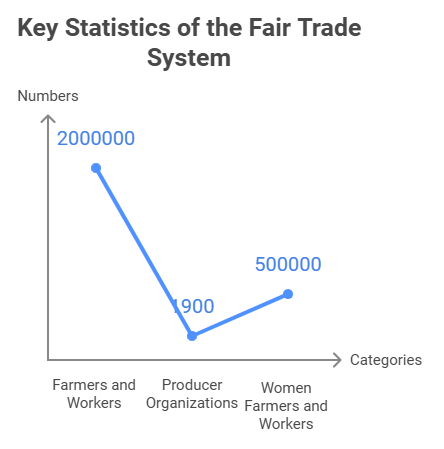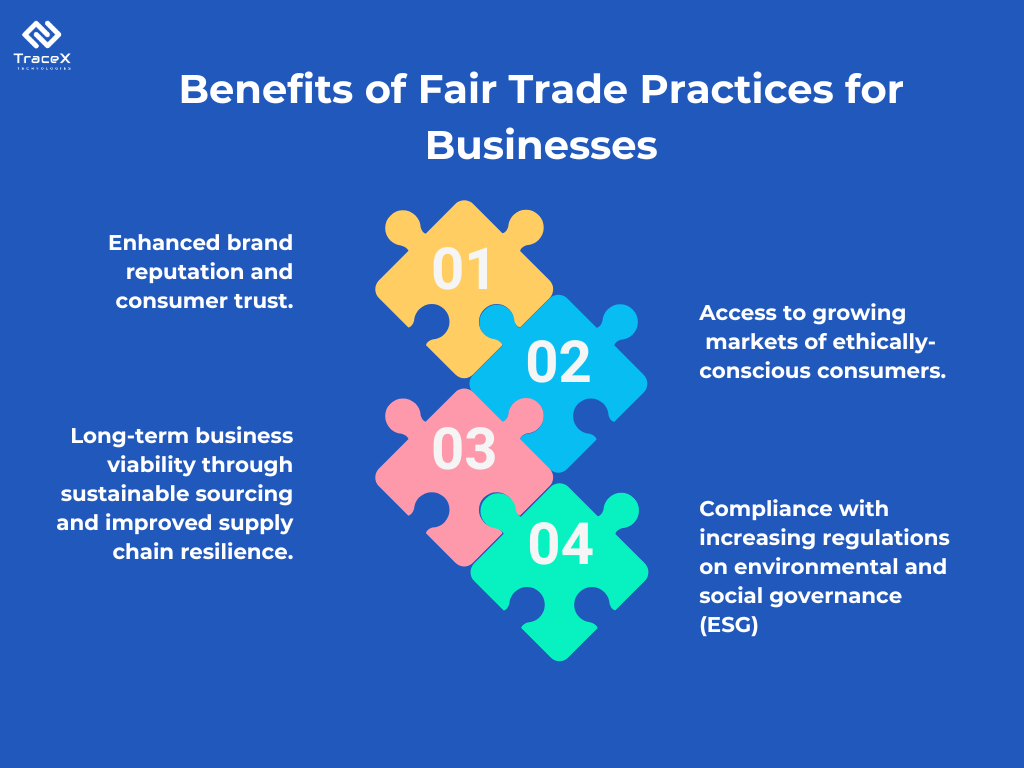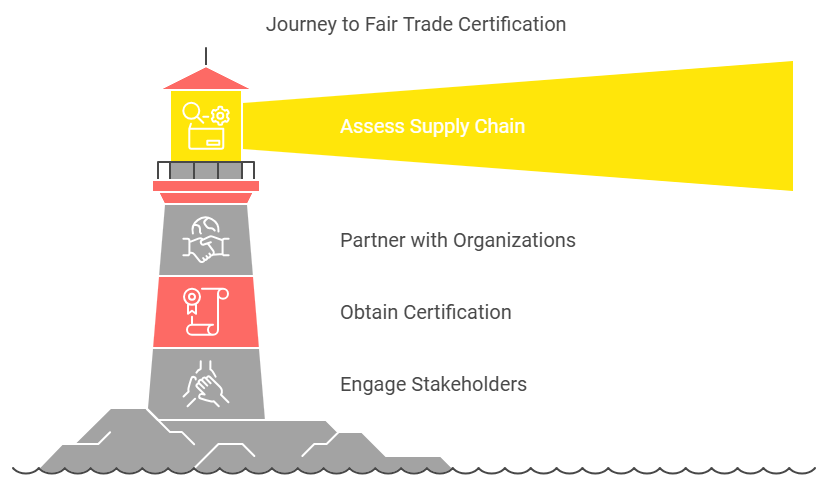Contact: +91 99725 24322 |
Menu
Menu
Quick summary: Explore how fair trade practices contribute to supply chain sustainability, empowering businesses to ensure ethical sourcing, fair wages, and environmental stewardship through digital tools like blockchain and IoT.

Imagine a world where your business not only thrives but actively contributes to the welfare of workers, supports environmental regeneration, and builds long-lasting consumer trust. Fair trade practices hold the key to transforming your supply chain into a powerful force for good, addressing both social inequities and environmental degradation
According to Social Justice Resource Centre, worldwide, sales of Fairtrade certified products exceed $10 billion each year
Sustainable supply chains not only minimize negative environmental footprints but also create long-term value for businesses by promoting ethical labor practices, reducing waste, and fostering local community development. However, many organizations struggle to align profitability with sustainability, often overlooking the potential for fairness and equity in their supply chain operations The good news is that adopting fair trade practices can be the game-changer that delivers tangible benefits for both your bottom line and the planet, all while satisfying increasing consumer demand for ethical and transparent business operations.
Key Takeaways
Fair trade is a movement that focuses on creating more ethical, sustainable, and transparent trade relationships between businesses and producers. It ensures that workers, farmers, and artisans in developing countries are paid fairly, work in safe conditions, and are empowered to have a say in their own future. Instead of exploiting workers or cutting corners on environmental impact, fair trade promotes the idea that businesses can thrive while making a positive difference in the world.
At the heart of fair trade practices are a few key principles that help guide businesses and producers towards more ethical and sustainable practices:
Several recognized standards guide fair trade practices. One of the most common is Fair Trade Certification, which is issued by various organizations like Fair Trade International or Fair Trade USA. These certifications ensure that businesses meet specific criteria for ethical sourcing, environmental responsibility, and community impact.
Ethical Sourcing is another key aspect, which means that businesses commit to sourcing materials from suppliers who adhere to fair trade standards. By choosing fair trade-certified products, companies ensure they are part of a supply chain that supports ethical production and trade practices.

Fair trade is essential for creating more equitable global trade relationships. Traditionally, supply chains have often exploited producers in developing countries, paying them low wages for hard labor while taking advantage of their lack of bargaining power. Fair trade flips this model, ensuring that producers receive fair compensation for their work, empowering them to improve their living standards and invest in their communities.
By incorporating fair trade practices, businesses can contribute to breaking the cycle of poverty, while also promoting more ethical and responsible consumerism. This helps to create a fairer, more balanced global economy where both businesses and producers can succeed together.
Fair trade isn’t just about treating people fairly—it’s also about making sure that the environment and local economies are protected for the long term.
One of the core goals of fair trade is to reduce the negative impact that business operations can have on the environment. Fair trade promotes sustainable farming and production practices that help conserve natural resources and protect ecosystems.
By promoting these sustainable practices, fair trade helps businesses minimize their environmental impact, while also encouraging responsible production that can be sustained for years to come.
Fair trade is all about social sustainability, which means ensuring that the people in the supply chain—especially those in developing countries—are treated with dignity and respect.
TraceX’s innovative blockchain traceability solutions transformed the rose value chain of a bio nutraceutical partner by enhancing socio-economic sustainability. By implementing end-to-end traceability, the partner could ensure ethical sourcing, fair compensation for farmers, and adherence to sustainable practices throughout the supply chain. This transparency helped strengthen trust with consumers, improve operational efficiencies, and drive positive social and economic outcomes for all stakeholders involved. TraceX’s solution not only ensured compliance and authenticity but also empowered the partner to create a lasting, positive impact on the communities and environment linked to their rose production.
Through these practices, fair trade ensures that workers are not only fairly compensated but also empowered to create better lives for themselves and their communities.
The dairy industry significantly contributes to India’s growth by empowering farmers and driving economic progress. TechnoServe, a leading nonprofit, collaborates with TraceX to enhance milk traceability systems, ensuring the procurement of high-quality milk. This initiative strengthens farmers’ and entrepreneurs’ capabilities, promoting sustainable dairy practices. Women farmers, in particular, are leading this transformation, building better livelihoods and creating more sustainable, thriving communities. Their efforts drive meaningful change, demonstrating the impact of empowerment and innovation in India’s dairy sector.
Fair trade practices also have a big impact on local economies, especially in rural areas or developing countries where smallholder farmers and producers often face significant challenges.
Through these economic benefits, fair trade practices help create a more resilient, fair, and balanced global economy where local communities can thrive and businesses can maintain sustainable operations.

While fair trade offers numerous benefits for businesses, workers, and communities, implementing fair trade practices across a supply chain can come with its own set of challenges
Fair trade is all about making sure that people, communities, and the environment are treated with respect in every part of the supply chain. One of the most powerful ways it achieves this is by creating transparency—which means being open about how products are made, who makes them, and under what conditions. Along with that, fair trade ensures accountability, which means businesses are held responsible for meeting ethical standards.
Thanks to modern digital tools, businesses can now ensure that their supply chains are transparent and that fair trade standards are being followed at every step.
To ensure that fair trade standards are being followed, it’s not just about relying on digital tools; there also need to be independent audits, third-party sustainability certifications, and traceability systems in place.

The TraceX Sustainability Platform plays a key role in enhancing transparency and accountability in supply chains, making it easier for businesses to adhere to fair trade practices. By leveraging technologies like blockchain and IoT, TraceX enables real-time tracking and monitoring of products from their source to the end consumer. This ensures that every step of the supply chain is traceable and verifiable, supporting businesses in maintaining fair wages, ethical sourcing, and sustainable production practices.
Additionally, TraceX’s certification management and audit systems provide businesses with the tools needed to ensure compliance with fair trade standards. By integrating these features into their operations, companies can easily demonstrate their commitment to social and environmental responsibility, building trust with consumers and stakeholders while maintaining a competitive edge in a sustainability-driven market.
Integrating fair trade practices into supply chains is not only a moral imperative but also a smart business strategy. By ensuring ethical sourcing, fair wages, and sustainable production methods, businesses can build trust, enhance their brand reputation, and contribute to a more equitable and sustainable global economy. With the support of digital tools like blockchain and IoT, fair trade becomes more transparent, traceable, and manageable, driving long-term success for businesses committed to social, environmental, and economic sustainability.
Fair trade principles focus on ensuring fair wages for workers, sustainable sourcing of materials, and environmentally sustainable practices throughout the supply chain. These principles promote transparency, accountability, and support for marginalized communities.
Fair trade practices promote sustainable farming techniques, reduce waste, and conserve natural resources by encouraging businesses to source products responsibly. This helps in minimizing the environmental footprint of supply chains.
Yes, small businesses can adopt fair trade practices by partnering with certified fair trade organizations and using digital tools for traceability. Although there are some barriers, such as certification costs, the long-term benefits of ethical sourcing and sustainability can outweigh the initial investment.
